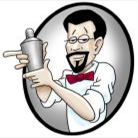I spent the five happiest years of my life in a morgue. As a forensic scientist in the Cleveland coroner’s office I analyzed gunshot residue on hands and clothing, hairs, fibers, paint, glass, DNA, blood and many other forms of trace evidence, as well as crime scenes. Now I'm a certified latent print examiner and CSI for a police department in Florida. I also write a series of forensic suspense novels, turning the day job into fiction. My books have been translated into six languages.
Most people die in their homes, so that's the 'normal' place to find them, but there are plenty of more unusual incidents as well. It's never scary, though, since when I go there I'm surrounded by cops, EMS workers, possibly firemen, Medical Examiner staff etc. I always observe the body where it is found, since that is my job. The Medical Examiner's or Coroner's office staff examines the body at their lab, so they can choose to come to the scene or not. If the death appears to be straightforward and natural, they will often not come to the scene and simply have the body transported to them.
Oh, sorry, for some reason I thought you meant that the guy had done it himself. In that case it is quite possible of course. The scene would be very bloody, of course, with all those injuries. The bodies would bleed out but probably more from gravity than from the heart pumping because they would have died so quickly. (At least I’m assuming the attack was over quickly.) The heart is about the size of the person’s fist and, obviously, would be blood covered after removal. A brain is grayish white and convoluted and other than some blood smears would look fairly neat, if the entire thing was removed carefully as one would at an autopsy. The killer would need a scraping tool and the expertise to do that. Otherwise it would probably look pretty mangled, but still largely a grayish white color.Hope that helps!
I'm sorry but I'm not versed in microbiology.
I have no idea. They didn't have forensic science degrees when I went to school. But I will check with a friend of mine who teaches.
Bartender
 What's the best way to get a bartender's attention?
What's the best way to get a bartender's attention?
Personal Stylist & Life Coach
 What makes someone qualified to life-coach someone else?
What makes someone qualified to life-coach someone else?
Casino Marketer
 What would be some less obvious ways someone could save money on a Vegas trip?
What would be some less obvious ways someone could save money on a Vegas trip?
Generally bodies in the water decompose more slowly than bodies exposed to air, but more specifically than that I cannot tell you. I did find this: https://digital.library.txstate.edu/handle/10877/4078
It's really a pathology question and not my area. Also colder temperatures will cause slower decomposition than warmer temps.
I definitely can't answer your second question but also, are you asking a) how long the person lived as a sailor b) how long the person was in the water before the hand was cut off or c) how long they might have survived in the water after the hand was cut off (assuming they had no access to a tourniquet and such like)? If you could locate someone who worked as a ship's doctor they might be a big help.
Best of luck!!
A 'forensic science technician' can refer to anything from someone who works in the Property Department to someone who does DNA analysis to someone who investigates death scenes. A good way to get a handle on the situation is to look at online job postings from places where you might want to work--the local police department, the county morgue, the state crime lab. They will post the duties and requirements for each position. You can also check the same information on the websites of professional organizations such as the American Academy of Forensic Sciences or the International Association for Identification. That should give you a good start.
I'm afraid not. I'm guessing that would depend entirely on how large the bandage is and how much the person bled. Best of luck!
-OR-
 Login with Facebook
Login with Facebook (max 20 characters - letters, numbers, and underscores only. Note that your username is private, and you have the option to choose an alias when asking questions or hosting a Q&A.)
(A valid e-mail address is required. Your e-mail will not be shared with anyone.)
(min 5 characters)
By checking this box, you acknowledge that you have read and agree to Jobstr.com’s Terms and Privacy Policy.
-OR-
 Register with Facebook
Register with Facebook(Don't worry: you'll be able to choose an alias when asking questions or hosting a Q&A.)